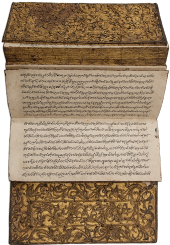Oral Tradition
पायासिसुत्तं
- attributed to the followers of The Buddha
- in तिपिटक (traditional Buddhist scriptures, circa 400 BC)
The Buddhist canon, called the Tipitaka in Pali, comprises categories of scriptures, the largest of which contains discourses and sermons of the Buddha and his followers. This sermon, the “Payasa Sutta”, believed to have been formulated after the Buddha’s death, tells the experience of Prince Payasi who doubted the truth of reincarnation and the principle of Karma. As he seeks guidance, the Reverend Kumara asks him to consider the Heaven of the Thirty-Three Gods, where time passes at a different rate than in our world. Not actual time travel, but it is the earliest definite mention of a related time phenomenon that we know of. —Michael Main
‘‘किञ्चापि भवं कस्सपो एवमाह, अथ खो एवं मे एत्थ होति – ‘इतिपि नत्थि परो लोको, नत्थि सत्ता ओपपातिका, नत्थि सुकतदुक्कटानं कम्मानं फलं विपाको’’’ति। ‘‘अत्थि पन, राजञ्ञ, परियायो …पे॰… ‘‘अत्थि, भो कस्सप, परियायो…पे॰… ``यथा कथं विय, राजञ्ञाति? ‘‘इध मे, भो कस्सप, मित्तामच्चा ञातिसालोहिता पाणातिपाता पटिविरता अदिन्नादाना पटिविरता कामेसुमिच्छाचारा पटिविरता मुसावादा पटिविरता सुरामेरयमज्जपमादट्ठाना पटिविरता, ते अपरेन समयेन आबाधिका होन्ति दुक्खिता बाळ्हगिलाना। यदाहं जानामि – ‘न दानिमे इमम्हा आबाधा वुट्ठहिस्सन्ती’ति त्याहं उपसङ्कमित्वा एवं वदामि – ‘सन्ति खो, भो, एके समणब्राह्मणा एवंवादिनो एवंदिट्ठिनो – ये ते पाणातिपाता पटिविरता अदिन्नादाना पटिविरता कामेसुमिच्छाचारा पटिविरता मुसावादा पटिविरता सुरामेरयमज्जपमादट्ठाना पटिविरता, ते कायस्स भेदा परं मरणा सुगतिं सग्गं लोकं उपपज्जन्ति देवानं तावतिंसानं सहब्यतन्ति। भवन्तो खो पाणातिपाता पटिविरता अदिन्नादाना पटिविरता कामेसुमिच्छाचारा पटिविरता मुसावादा पटिविरता सुरामेरयमज्जपमादट्ठाना पटिविरता। सचे तेसं भवतं समणब्राह्मणानं सच्चं वचनं, भवन्तो कायस्स भेदा परं मरणा सुगतिं सग्गं लोकं उपपज्जिस्सन्ति, देवानं तावतिंसानं सहब्यतं। सचे, भो, कायस्स भेदा परं मरणा सुगतिं सग्गं लोकं उपपज्जेय्याथ देवानं तावतिंसानं सहब्यतं, येन मे आगन्त्वा आरोचेय्याथ – `इतिपि अत्थि परो लोको, अत्थि सत्ता ओपपातिका, अत्थि सुकतदुक्कटानं कम्मानं फलं विपाकोति।

translate
“Well then, chieftain, I’ll ask you about this in return, and you can answer as you like. A hundred human years are equivalent to one day and night for the gods of the Thirty-Three. Thirty such days make a month, and twelve months make a year. The gods of the Thirty Three have a lifespan of a thousand such years. Now, as to your friends who are reborn in the company of the gods of the Thirty-Three after doing good things. If they think, ‘First I’ll amuse myself for two or three days, supplied and provided with the five kinds of heavenly sensual stimulation. Then I’ll go back to Pāyāsi and tell him that there is an afterlife.’ Would they come back to tell you that there is an afterlife?”
